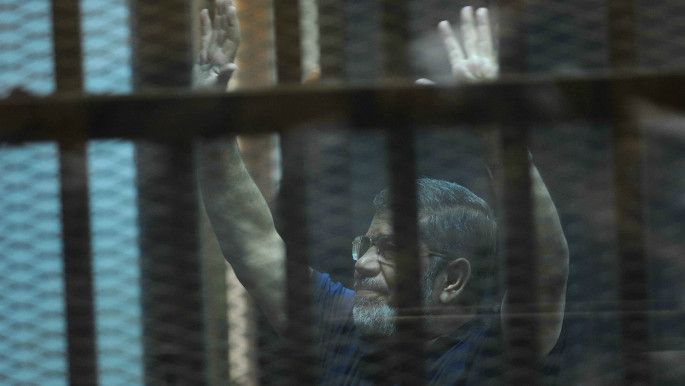Morsi death sentence intensifies pressure on Sisi
An Egyptian court on Saturday sentenced deposed president Mohamed Morsi and more than 100 other people to death for their role in a mass jailbreak during the 2011 uprising, a decision that has sparked condemnation both nationally and internationally.
Judge Shabaan El-Shamy handed down the same sentence to more than 100 other defendants including Muslim Brotherhood leader Mohamed Badei, already sentenced to death in another trial, and his deputy Khairat al-Shater.
Morsi, sitting in a caged dock in the blue uniform of convicts after already been sentenced to 20 years for inciting violence, raised his fists defiantly when the verdict was
read.
| Egypt is turning back into ancient Egypt - Turkish President Erdogan |
Morsi, elected president in 2012 as the Brotherhood's compromise candidate after Shater was disqualified, ruled for only a year before mass protests spurred the military to overthrow him in July 2013.
He was among dozens of Islamist leaders detained amid a crackdown that left hundreds of Morsi supporters dead.
Many of those sentenced on Saturday were tried in absentia, including prominent Qatar-based Islamic cleric Yusuf al-Qaradawi.
The court will pronounce its final decision on June 2, since under Egyptian law, death sentences are referred to the mufti, the government's interpreter of Islamic law, who plays an advisory role.
However, al-Qaradawi said the death sentences ran contrary to Islamic law.
"I distance myself from these rulings," he said in a statement relayed by Doha-based broadcaster Al-Jazeera.
"They have no value and cannot be implemented because they are against the rule of God and people's laws and customs."
Negative reactions
International reactions following the sentence also indicated that the status of the Egyptian judiciary is in decline and that its credibility is in doubt.
The European Union denounced the death sentence, noting the penalty stemmed from a flawed trial.
"The court decision to seek the death penalty... was taken at the end of a mass trial that was not in line with Egypt's obligations under international law," said the EU's top diplomat Federica Mogherini in a statement.
She added that Egypt has to guarantee defendants' rights to a fair trial and to an independent investigation. Her statement said the EU believes the sentence will be revised upon appeal.
"The EU opposes capital punishment under all circumstances," Mogherini said. "The death penalty is cruel and inhumane."
The United States expressed "deep concern" with a State Department official stating "We have consistently spoken out against the practice of mass trials and sentences, which are conducted in a manner that is inconsistent with Egypt's international obligations and the rule of law."
Noting that they were preliminary sentences, the official added: "We continue to stress the need for due process and individualised judicial processes for all Egyptians in the interests of justice."
Human Rights organisation Amnesty International also lashed out at Saturday's verdict, saying it reflected "the deplorable state of the country's criminal justice system".
"The death penalty has become the favourite tool for the Egyptian authorities to purge the political opposition," the London-based rights watchdog said.
Turkish President Recep Tayyip Erdogan condemned the death sentence, saying the country was "turning back into ancient Egypt", referring to Pharaonic rule that ended more than two millennia ago.
"The West, unfortunately, is still turning a blind eye to Sisi's coup," he added.
READ ALSO: Social media reactions #Trending: Morsi is 'not alone'
 |
|
| Morsi sitting in a caged dock in the blue uniform of convicts (AFP) |
'War against the Brotherhood'
Egypt's first freely elected leader, Mohamed Morsi, came to power following the 2011 ouster of Hosni Mubarak.
But after just a year in power, Morsi was himself toppled by then-army chief and now President, Abdel Fattah al-Sisi.
Experts said the verdict underscored Sisi's vow to eradicate the 87-year-old Muslim Brotherhood movement.
An Egyptian diplomat, who refused to be named, told al-Araby al-Jadeed "The entire world now realises that what is happening in Egypt is a political assassination of those rejecting the coup, and therefore, the entire verdicts are not judicial, but rather political."
"Sisi has placed Egypt - the state, not the regime - in an awkward situation internationally, tarnished the reputation of the Egyptian judiciary, and has let the country become an object of international criticism" he added.
Professor of Middle East studies at the London School of Economics and Political Science, Fawaz Gerges, told AFP "The new regime of President Abdel Fattah al-Sisi is using all elements of the state to break the political will of the Muslim Brotherhood."
"The judicial system is also waging an all-out war against the Muslim Brotherhood. This clearly reflects a total war waged by the Egyptian state against the Muslim Brotherhood" Gerges added.
Another source, who again wished to be unnamed, told al-Araby al-Jadeed that "the ministry is under a lot of pressure now on how it should deal with the international community in the wake of the death sentences and the domestic legal and security measures."
Political expert, Mokhtar Ghobashi, said "The international community tried more than once to solve the crisis, but to no avail. They thought Sisi might able to solve it his way, but this too did not happen."
Ghobashi believes that although the regime considers the death sentences as its "last card" it could now become the object of international disapproval and could prompt international human rights organisations to go after the current regime.





 Follow the Middle East's top stories in English at The New Arab on Google News
Follow the Middle East's top stories in English at The New Arab on Google News
![Netanyahu furiously denounced the ICC [Getty]](/sites/default/files/styles/image_330x185/public/2024-11/GettyImages-2169352575.jpg?h=199d8c1f&itok=-vRiruf5)
![Both Hamas and the Palestinian Authority welcomed the ICC arrest warrants [Getty]](/sites/default/files/styles/image_330x185/public/2024-11/GettyImages-2178351173.jpg?h=199d8c1f&itok=TV858iVg)
